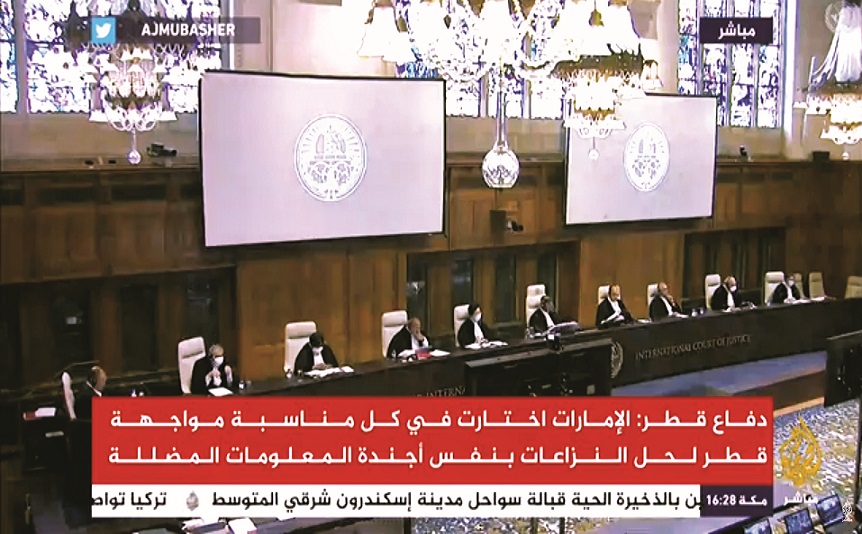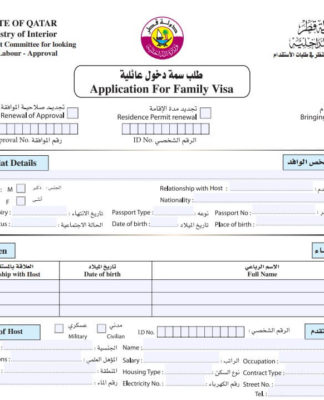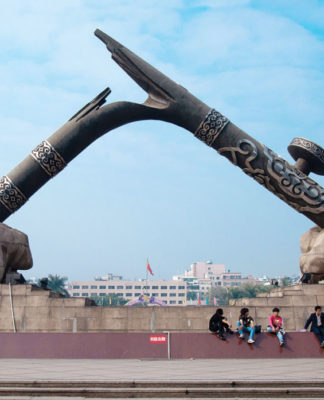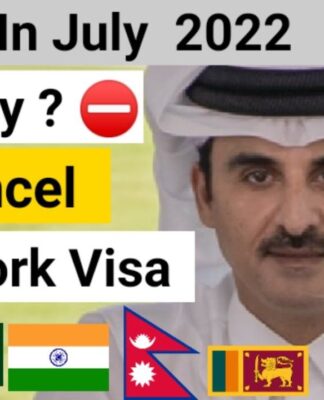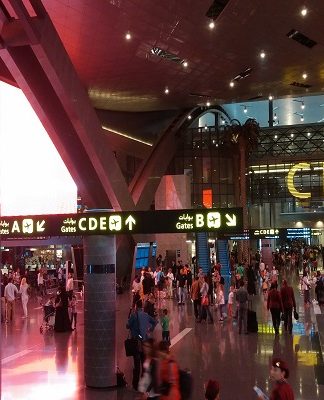Qataris were deprived of privileges enjoyed by citizens of the Gulf Cooperation Council and were subjected to arbitrary coercive behavior
Qatar fulfilled the procedural requirements of the court’s jurisdiction in accordance with the Convention against Racial Discrimination
The UAE’s version of the events of June 5 contradicts the reality that has demonstrated that Qataris are subject to discrimination
The UAE granted 14 days for Qatari residents and visitors to leave its lands under the pretext of security reasons
Thousands of Qataris were forced to leave in June 2017, following instructions published by Abu Dhabi media
After a year of the expulsion procedures, the UAE tried to backtrack, and proved itself the accusation
The UAE measures against merchants, students, and property owners are not related to immigration or passport procedures
A campaign of incitement practiced by the UAE against everything that is Qatari and all who sympathize with the Qataris
The team of lawyers for the State of Qatar before the International Court of Justice reviewed the discriminatory measures and measures taken by the UAE during yesterday’s session, which was held in two stages, and the team explained the reasons for rejecting and rejecting these objections.
The defense team affirmed that the facts on which the State of Qatar’s defense is based prove that the UAE has committed acts that fall within the jurisdiction of the court, and the team explained the flaws that the UAE had fallen into in interpreting the agreement, explaining that the accepted meaning of the national origin is read in the context of the agreement and in accordance with its objectives and purposes.
The Qatari defense team dealt with basic points related to showing that when drafting the agreement it emphasized that the concept of current nationality is included in the term national origin, and made it clear that the court has jurisdiction to consider the dispute on a separate and alternative basis based on the fact that the measures taken by the UAE have a discriminatory intent and that they have With an impact on Qatari citizens in its historical and cultural sense, the team reviewed Qatar’s reading of the agreement that is in line with the interpretation and practices of the Convention Committee and which should be of greater importance. The defense team stressed the need to reject the UAE objection, noting that the State of Qatar fulfilled the procedural preconditions for the jurisdiction of the court contained in Article 22 of the Convention against Racial Discrimination.
The team explained that the pleadings of both parties go a clear path towards the stage of considering the merits of the case, and also made clear that the UAE’s proposed perception of the case would undermine the effectiveness of the agreement and harm the important duties undertaken by the procedures committee.
False allegations
The Qatari defense team confirmed that the origin of the objection submitted by the UAE lies in the claim that the State of Qatar’s request does not fall within the scope of the Convention on the Elimination of All Forms of Racial Discrimination. This is because the State of Qatar relies in its lawsuit on the racial discrimination suffered by Qatari citizens, but the nationality was not mentioned among the forbidden reasons in the first chapter of the first paragraph of the convention, and it prohibits racial discrimination based on national origin.
The defense team noted that the UAE wants to push the court to conclude with its objection that what happened in June 2017 is not one of the events within the jurisdiction of the court according to the agreement, which is a narrative that contradicts the facts that took place. The defense confirmed that the UAE authorities had adopted the expulsion of Qatari residents and visitors, in an attempt to falsify the facts.
14 days to leave
The defense team recovered the measures taken by the UAE, as it gave Qatari citizens, residents and visitors, 14 days to leave the UAE for security reasons. These are clear words issued by the UAE Ministry of Interior and adopted by the media, including the official news agency in the United Arab Emirates and social networking sites, and includes Qataris who were forced to leave in the thousands in June 2017 in addition to the procedures that accompanied this announcement, whether by individual expulsion by the Ministry of Interior or other methods, and the message was clear She arrived and the attached certificates in Qatar’s memorandum confirm this, as the aim was to violate the rights of its citizens. They tried to rectify this announcement in 2018 by announcing that it was published 3 days after the Qatari case was submitted to the International Court of Justice, but this does not help them in anything but rather proves the opposite, and reflects the UAE’s attempt to correct the situation and send a message different from the June 2017 announcement to convince the court that these inflammatory measures are not It has no basis.
The team emphasized that nothing justifies a different answer today and that this conclusion imposes itself with regard to the allegations of the Emirates and that the matter is not related to preventing entry to Qataris and their claim that the matter requires a prior permit through an Internet site and a telephone line affiliated with immigration and passports, but this contradicts what happened on the ground that Prove that Qataris are not allowed to enter the Emirates.
He pointed out that preventing Qatari citizens from entering was not a measure of the Emirati Immigration and Passports Department, but rather an explicit, clear and unambiguous ban preventing Qataris from entering UAE lands. Families involved were tightened and it was not just a normal procedure.
Arbitrary coercive behavior
The team confirmed that measures were taken against merchants, students and property owners who were strictly prohibited from entering the UAE, facts that are not related to immigration procedures or passports, but decisions that target Qatari citizens and inform them that they threaten the security of the Emirates, and it is a racially discriminatory treatment just because they are Qatari, while they enjoy all the advantages. Citizens of the Gulf Cooperation Council countries were deprived of these privileges and were subjected to coercive and arbitrary behavior.
He pointed out that the measures adopted by the UAE authorities did not stop at the expulsion and preventing entry to the Emirates, but that Abu Dhabi wanted to strike everything related to Qatar on its territory, and that was by blocking websites and media such as Al Jazeera and BN Sport, which are measures related to penalties accompanying each Those who stand in solidarity with the Qataris as well as the media distortion campaign and incitement to hatred and hatred against the State of Qatar.
It was clear that the UAE’s goal was to target everything that is Qatari to put pressure on the government of the State of Qatar.
Abu Dhabi has not demonstrated goodwill or willingness to negotiate.
Lawyers of Qatar: Qatar respected the terms of negotiation in the laws
The UAE representative presented a completely flimsy and superficial argument
The UAE is inconsistent with the laws and has suggested alternative interpretations
Mr. Lawrence Martin, a member of the defense team of the State of Qatar, explained why the court should reject the second objection of the UAE, and said that the UAE claimed that Qatar did not comply with the conditions of negotiation and the procedures before the reconciliation committee. We have heard a contradictory argument from the representatives of the UAE and that these measures for Article 22 were alternative and cumulative. They changed their argument that Qatar should have abandoned the procedures of the reconciliation committee, and the representative of the Emirates also claimed that the State of Qatar did not comply with the terms of the negotiations, which is not true.
He stressed that Qatar respected the terms of negotiation, stressing that the representative of the Emirates presented a completely flimsy and superficial argument, claiming that Qatar did not comply with the terms of negotiation, and that it did not have goodwill to negotiate reconciliation, and said that the speed in changing the subject by the representative of the Emirates shows that the State of Qatar In good faith I advanced to negotiate in accordance with Article 22, and the same applies to the issue of civil aviation. Qatar has tried to negotiate with the UAE to resolve the conflict and has made multiple attempts in this regard, and these are good efforts, while the UAE has expressed its lack of interest in negotiating, as officials from the UAE confirmed that it She does not want to negotiate with Qatar.
Sincere efforts
Martin added that the April 25, 2018 message of the negotiation proposal summarizes the efforts of the State of Qatar to negotiate and its desire to do so, and this message proves Qatar’s good intentions and was a call to negotiate the issue, but the UAE clearly refused, contrary to what the UAE representative claimed, and did not respond to those The message left behind repercussions, including litigation before the International Court of Justice, and in the event of refraining from negotiating, any dispute is referred to other parties to settle and adjudicate it as the International Court of Justice does, and he said that Qatar’s message was positive, and it was sufficient for Qatar to present that message and specify Penetrations and violations and to request negotiation in this regard, and this is what really happened on the ground.
He warned that the UAE is aware of the repercussions of the decision not to respond to the calls for negotiation, unlike the State of Qatar, which welcomed the negotiation, and explained that the representative of the UAE tried to deviate from the essence of the matter by claiming that Qatar did not fulfill the terms of reconciliation. He said that instead of talking about Article 22, the representative of the UAE talked about general foreign doctrines that justify reading the Emirates, but we do not need to return to legal principles, as the court’s decision in the case of Russia and Ukraine that they tried to measure is unambiguous, and stated that the principle of good faith is not An international obligation, but rather to set favorable conditions for rights, and the UAE has not established this right related to Article 22.
Martin pointed out that the court knew cases in which the litigants were accompanying resorting to the reconciliation committee, and therefore establishing a fact-finding mission does not negate with attempts to negotiate to defuse any two countries, and the court confirmed that negotiation and arbitration are included in Article 32 of the agreement and not a new argument. He stressed that the UAE’s position is not compatible with the agreement and therefore tried to focus on other points, and suggested alternative interpretations, and stressed that the court’s role is undoubtedly legal in this regard, as Qatar confirms that there is no conflict between litigation before the court and the fulfillment of procedures in the reconciliation committee.
Important issue
In turn, Professor Nko Chriver confirmed that the legal dispute settled by the court deals with a principled issue of great importance in the international legal context, and it stems from grave violations of one of the most important human rights conventions in the United Nations system. He said that the UAE’s measures had, and still are, a devastating impact on the Qataris and their families, which undermined the rights contained in articles 4, 6, 7 and 8 of the convention.
Chriver pointed out that the facts before the court prove that the UAE has blatantly violated the basis of dignity and equality enshrined in human beings, and the defenses submitted by Qatar confirm that the UAE’s primary goal cannot succeed, because the UAE’s argument reveals the true objectives of its behavior associated with that lawsuit.
He pointed out that the measures taken by the UAE impeded the basic rights stipulated in the agreement, and stressed that no discrimination should be made on the basis of nationality, and national origin has been interpreted as including nationality, and the UAE has targeted Qatari citizens on the basis of their nationality and this is an important evidence that must be considered during the case.
Professor Chriver said that even if the narrow definition put forward by the UAE regarding the current nationality and its relationship to national origin was taken into account, the UAE’s measures are discrimination against Qataris on the basis of their national origin in terms of targeting and effects, and these measures can be based on a protective aspect even if it targets situations and characteristics. Certain.
He indicated that the UAE’s first objection to the issue of the court’s discussion of the case loses its basic legal characteristic, and stressed that Qatar has responded to the preconditions for the benefit, explaining that the UAE is trying to search for legal exits, explaining that the court is required to stop all measures based on discrimination, and these measures are continuing. Years ago to today.














